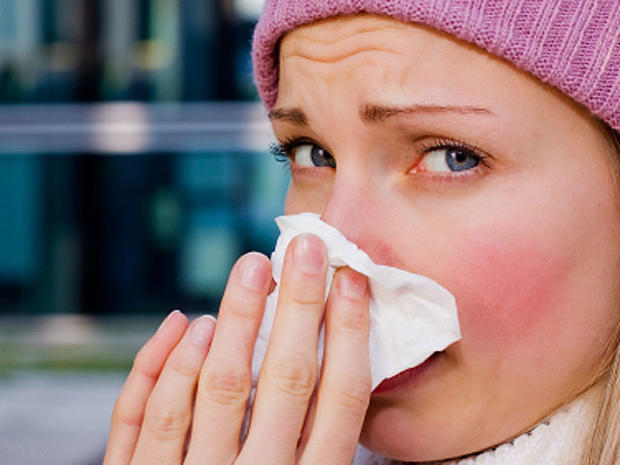Hidden holiday allergy triggers: How to stay protected
Dr. Clifford Bassett, a clinical assistant professor of medicine at NYU Langone Medical Center in New York City and director of Allergy & Asthma Care of New York, tells CBSNews.com that it's essential to have a holiday action plan to stay ahead of allergic reactions and irritation caused by common staples of the holiday season.
"Pre-treatment before symptoms begin is a secret to success," he says.
With help from Dr. Bassett, keep clicking to see some common triggers that might set off an allergic reaction or cause an uncomfortable evening for you and your holiday guests, and find out how to stay protected.
Christmas trees
He recommends wiping the needles down with a damp cloth or vegetable cleaner, as mold can develop within several days.
Artificial trees can also carry allergy risks, Bassett warns, if they're sprayed with chemicals -- such as those to make artificial snow.
The bottom line? Whether it be natural or artificial, it's important to keep your trees clean.
Poinsettia
Allergic reactions can be caused even without direct contact, if a pet rubs up against poinsettia and bumps into someone with an allergy, Bassett adds.
Holiday decorations
"A lot of people spread dust and mold when they break out the holiday decorations," warns Bassett. He recommends buying washable, non-porous decorations that won't trap hidden dust.
"To plan ahead for next year, make sure to put the decorations away in a sealed bag or container," he adds.
Cold weather
Try to reduce your outdoor exposure to stave off Skier's nose.
Humidifiers
"If you have dry nasal passages, mild humidification can ease symptoms," says Bassett. "Just don't turn your home into a greenhouse."
Pets
For those who may have guests with pet allergies or are allergic themselves, Bassett recommends an air purifier with a HEPA filter. Some ventilation systems in homes can even be retrofitted with HEPA filters.
NASA researchers also have evidence that certain indoor plants like English ivy and weeping fig may help reduce indoor air pollutants like pet dander and dust mites.
Fragrances
Fragrances rarely cause allergic reactions in the physiological sense, says Dr. Bassett, but they can cause irritation of the nose, eyes, throat or lungs and cause symptoms that mimic allergy, including: runny nose, nasal congestion, sneezing, post-nasal drip, cough, worsening asthma, headache, and watery, burning or itchy eyes. In general, those with allergies and/or asthma may have more easily irritated eyes, nasal and bronchial passages.
Potpourri and scented candles, which are popular during the holidays, can also cause irritation to the airways.
Food allergies
If you or your child has food allergies, Bassett recommends to call ahead to your host, restaurant or child's school to make sure accommodations are made to eat safely. A "chef card" that's designed to alert others to ingredients that a person needs to avoid can also be helpful. For young kids especially, he recommends bringing a bag of safe-to-eat snacks.
Dr. Bassett and staff educate their patients to be "label detectives" and learn the science of de-coding ingredients, which is essential in reducing allergy risk. He further cautions that in preparing holiday meals, some labels say the product "may contain" nuts or milk for example, because a manufacturer produces the product in the same plant as those allergy-inducing foods, so always take those labels seriously. Cross contamination can occur with the use of common utensils and countertops, so be careful.
And for those with a history of severe allergic reactions, make sure you have an EpiPen Auto-Injectors handy, he recommends.
For more information on holiday allergies, visit theAmerican College of Allergy, Asthma and Immunology website and follow Dr. Bassett on Twitter.








